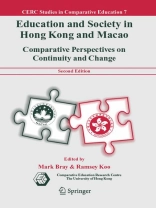Hong Kong and Macao have much in common. The dominant populations in both territories are Cantonese-speaking Chinese; both are small in area; both are urban societies; both have been colonies of European powers; and both have undergone political transition to reunification with China. Yet in education, for reasons that are analysed in this book, they are very different.
The patters of similarities and differences in the two territories make a fascinating basis for comparative study.
The overarching theme of the book, on continuity and change is particularly pertinent following the transition of the two societies of the postcolonial era.
This thoroughly-revised and expanded second edition builds on the widely-acclaimed first edition. The work has been recognised as a significant contribution to the broad field of comparative education as well as to study of the specific societies which are its main focus.
विषयसूची
Levels and Sub-sectors.- Preschool Education.- Primary and Secondary Schooling.- Higher Education.- Teacher Education.- Lifelong Learning and Adult Education.- Political, Economic and Social Issues.- Church, State and Education.- Higher Education, Imperialism and Colonial Transition.- Higher Education and the Labour Force.- Language and Education.- Curriculum Policies and Processes.- Curriculum Reform.- Civic and Political Education.- Secondary School History Curricula.- Secondary School Mathematics Curricula.- Conclusions.- Methodology and Focus in Comparative Education.- Continuity and Change in Education.
लेखक के बारे में
Mark Bray is Chair Professor of Comparative Education at the University of Hong Kong.
Ramses Koo is a Senior Lecturer at the Hong Kong Institute of Education. Both have long experience of research on education in Hong Kong and Macao; and both are active in professional societies concerned with comparative education.












